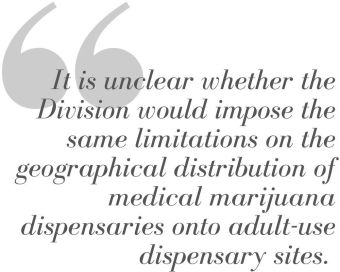Between October 11 and November 7, 2023, Ohio voters will decide whether to approve Issue 2 – a voter-initiated law "To Commercialize, Regulate, Legalize and Tax the Adult Use of Cannabis." A simple majority vote would permit Ohio individuals who are over the age of 21 to grow up to six plants and possess up to 2.5 ounces of cannabis, establish operational licensing through the newly-created Commerce Department Division of Cannabis Control, and create a 10% adult use tax on top of regular sales tax, the proceeds of which being disbursed to local governments, a social equity and jobs fund and the Division.
If passed, the Division would be required to make initial applications to adult use operators available within six months of the law's effective date. Sec. 3780.11(A). Within nine months of the law's effective date, the Division must issue adult-use licenses to cultivate, process, sell, and test marijuana for recreational use by adults 21 years and older.
Operators that currently hold either a medical marijuana certificate of operation or a provisional license that converts to a certificate of operation within two years of the law's effective date may apply for one or more adult-use licenses, which after that must be issued.

This must-issue provision could provide a significant head start in the adult-use market for any Ohio operator with a medical license. The licenses that must be issued are as follows:
- A medical marijuana retail dispensary issued a certificate of operation shall be issued an adult-use dispensary license for the current location of the dispensary and an adult-use dispensary license at a different location as designated in the license application if the dispensary does not have any common ownership or control with any level I adult use cultivator, level II adult use cultivator, or adult-use processor license applicant or licensee.
- A medical marijuana level I cultivator issued a certificate of operation or a provisional license shall be issued three adult-use dispensary licenses at locations designated in a license application and one level I adult-use cultivator license for the current location of its level I cultivation facility.
- A medical marijuana level II cultivator issued a certificate of operation or provisional license shall be issued one adult-use dispensary license at a location designated in the license application and one level II adult-use cultivator license for the current location of its level II cultivation facility.
- A medical marijuana processor issued a certificate of operation or provisional license shall be issued one adult use processor license for the current location of its processor.
- A medical marijuana testing laboratory issued a certificate of operation shall be issued one adult- use testing laboratory license for the current location of the testing laboratory.
Sec. 3780.10(B)(1)-(6). Ohio's Constitution provides that citizen-initiated statutes become effective 30 days after passage (If Issue 2 passes on November 7, the law would take effect on December 7, 2023).
The proposed law includes some of the same limitations appearing in the Ohio Medical Marijuana Act – for example, licensed locations cannot be within 500 feet of protected uses (i.e., a school, church, etc.), an individual owner cannot have a concurrent interest in a testing lab and another type of operator, all owners and employees must be at least 21 years old, certain criminal convictions will disqualify individuals from holding a license, employers may enforce any drug testing policy, and local governments may limit or prohibit operators within their jurisdictional borders.
Like any proposed law, a few unknowns will be determined by supplemental legislation or rule. For example, the Division must issue up to 40 adult-use cultivator and 50 additional adult-use dispensary licenses to applicants certified as cannabis social equity and jobs program participants – the timing of such issuance is not as explicit as for existing licensees. Sec. 3780.10(C)-(D). The Ohio Department of Development would create such a program from scratch and certify participants. Additionally, it is unclear whether the Division would impose the same limitations on the geographical distribution of medical marijuana dispensaries onto adult-use dispensary sites.
Finally, the degree to which the Ohio General Assembly may substantively modify or even repeal such a law remains a question of law. Recent polling margins show nearly 60% in favor of passage. If this polling turns out to accurately reflect what voters decide in November, the General Assembly's political appetite to make substantive changes or repeal it may be tempered despite well-publicized opposition by the Governor and Statehouse leaders.

In the interim, current medical marijuana operators should, at minimum, consider whether to submit the adult-use application, review existing dispensary lease agreements to confirm that adult recreational sales are permitted, and consider locations suitable for a new dispensary. If the initiative does pass, we recommend that licensees seek opportunities to participate in rulemaking and actively offer comments to local government officials for potential locations. Early and frequent contact with municipal and state officials is one proven way to avoid surprises.
Good counsel can help you navigate this process. With teams that have worked in a variety of new and emerging cannabis markets, including Ohio, Colorado, Michigan, New Jersey, and Illinois, we are familiar with many of the concerns that come up when a state first introduces adult-use sales. We can help your team identify opportunities and avoid pitfalls as you prepare for this exciting new phase in Ohio's cannabis marketplace.
The content of this article is intended to provide a general guide to the subject matter. Specialist advice should be sought about your specific circumstances.


